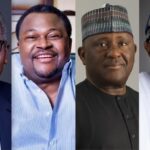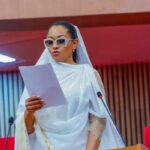President Bola Tinubu has approved the reconstitution of the Nigerian National Petroleum Company (NNPC) Limited board, resulting in the removal of Group Chief Executive Officer (GCEO) Mele Kyari and the appointment of Engineer Bashir Bayo Ojulari as his successor.
This decision to sack Mele Kyari, announced on April 2, 2025, underscores the administration’s commitment to enhancing operational efficiency and restoring investor confidence in Nigeria’s oil and gas sector, according to a statement by Bayo Onanuga, Special Adviser to the President (Information & Strategy). He added that the restructuring aims to “boost local content, drive economic growth, and advance gas commercialization and diversification.”
The newly constituted 11-member board will be chaired by Ahmadu Musa Kida as the non-executive chairman. Adedapo Segun, who assumed the role of Chief Financial Officer in November 2023, retains his position on the new board. Additionally, six non-executive directors have been appointed to represent Nigeria’s geopolitical zones, ensuring diverse regional representation.
The statement further emphasized that “President Tinubu removed all other board members appointed with Akinyelure and Mele Kyari in November 2023,” highlighting a comprehensive shift in the company’s leadership. This move is expected to bolster local content and attract investment, positioning NNPCL to better navigate the evolving global energy landscape.
This leadership change marks a pivotal moment for NNPCL as it seeks to implement reforms aimed at revitalizing Nigeria’s petroleum industry and enhancing its contribution to the nation’s economy.
The Statement reads:
“President Tinubu removed all other board members appointed with Akinyelure and Kyari in November 2023.
“The new 11-man board has Engineer Bashir Bayo Ojulari as the Group CEO and Ahmadu Musa Kida as non-executive chairman.
“Adedapo Segun, who replaced Umaru Isa Ajiya as the chief financial officer last November, has been appointed to the new board by President Tinubu.
“Six board members, non-executive directors, represent the country’s geopolitical zones. They are Bello Rabiu, North West; Yusuf Usman, North East, and Babs Omotowa, a former managing director of the Nigerian Liquified Natural Gas( NLNG), who represents North Central.
“President Tinubu appointed Austin Avuru as a non-executive director from the South-South, David Ige as a Non-executive director from the South West, and Henry Obih as a non-executive director from the South East.
Mrs Lydia Shehu Jafiya, permanent secretary of the Federal Ministry of Finance, will represent the ministry on the new board, while Aminu Said Ahmed will represent the Ministry of Petroleum Resources.
“President Tinubu, invoking the powers granted under Section 59, subsection 2 of the Petroleum Industry Act, 2021, emphasised that the board’s restructuring is crucial for enhancing operational efficiency, restoring investor confidence, boosting local content, driving economic growth, and advancing gas commercialisation and diversification.
“President Tinubu also handed out an immediate action plan to the new board: to conduct a strategic portfolio review of NNPC-operated and Joint Venture Assets to ensure alignment with value maximisation objectives.
“Since 2023, the Tinubu administration has implemented oil sector reforms to attract investment. Last year, NNPC reported $17 billion in new investments within the sector. The administration now envisions increasing the investment to $30 billion by 2027 and to $60 billion by 2030.
“The Tinubu administration targets raising oil production to two million barrels daily by 2027 and three million daily by 2030. Concurrently, the government wants gas production jacked to 8 billion cubic feet daily by 2027 and 10 billion cubic feet by 2030.
“Furthermore, President Tinubu expects the new board to elevate NNPC’s share of crude oil refining output to 200,000 barrels by 2027 and reach 500,000 by 2030.
“The new board chairman, Ahmadu Musa Kida, is from Borno State. He is an alumnus of Ahmadu Bello University, Zaria, where he received a degree in civil engineering in 1984. He also obtained a postgraduate diploma in petroleum engineering from the Institut Francaise du Petrol (IFP) in Paris.





